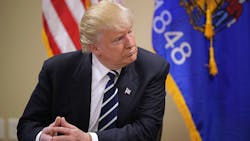Trump's Carrier Victory Is the US Economy's Loss: Commentary
Donald Trump has scored a political victory by persuading Carrier Corp., a maker of air-conditioning and heating equipment, to keep about 1,000 jobs in the U.S. For that he deserves congratulations-- and a warning not to do this kind of thing again.
There is a long (if not always honorable) tradition of mayors, governors and even presidents pleading with or browbeating corporate executives for one reason or another. But using the power of the presidency to micromanage companies is an awful idea. The free market works in part because it relies on millions of individual enterprises to decide how best to employ their resources. The government's role is to protect their right to do so, and to intervene only in those cases where the market fails--when misaligned incentives lead to environmental damage, for example, or financial instability.
In Carrier's case, the market was working. The company wanted to move production to Mexico to lower labor costs and remain competitive. American workers would lose jobs, but U.S. consumers and investors would get cheaper furnaces and/or better corporate earnings--and, potentially, more spending on U.S. imports by the Mexican workers who got the jobs. This constant shifting of resources tends to boost living standards both in the U.S. and abroad, by allowing everyone to focus on what they do best.
Trade does create winners and losers. But the way to cushion the loss to workers is to invest more in government programs to retrain them. And if Trump thinks Mexico's lax environmental regulations are making its labor unfairly cheap, he can address that in a trade deal--which is precisely what the Trans-Pacific Partnership, which he opposes, would do.
Instead, Trump is employing a combination of state tax concessions and not-so-subtle arm-twisting (Carrier parent United Technologies Corp. is a major defense contractor) to interfere in a specific company's efforts to adapt to a changing competitive landscape. In other words, Indianans will foot part of the bill for a deal that, while generating good headlines for the president-elect, may ultimately leave a major employer worse off and impair the economy's dynamism.
Consider also Ford Motor Co.'s decision to keep production of its Lincoln MKC sport utility vehicle in Kentucky--a move for which Trump has taken credit. The automaker had been considering moving the MKC to Mexico to make more room for the more popular Ford Escape, which is produced in the same factory. So to the extent that Trump influenced Ford, he may have done damage by preventing the company from efficiently responding to demand.
It's possible that Trump's intervention is a one-of-a-kind publicity stunt, rather than a precursor of official policy. If not, executives may become hesitant to make otherwise sensible moves for fear that they will attract a presidential tweetstorm. Bullying companies into bad decisions is no way to make America great.
